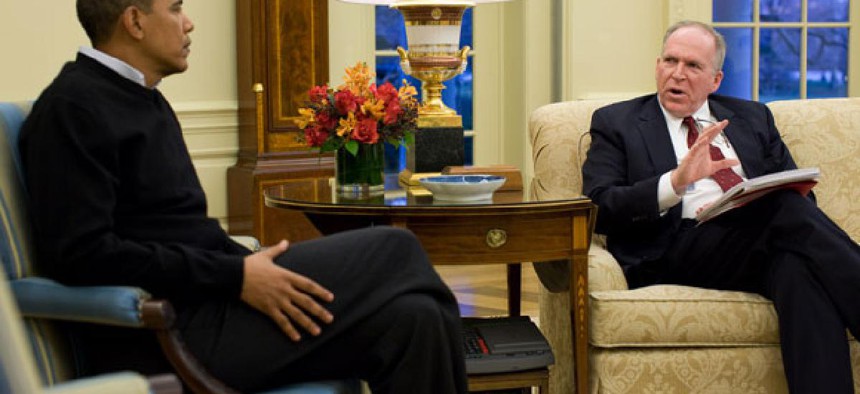
John Brennan briefs Barack Obama on national security issues in 2010. White House photo
Why John Brennan's path to the CIA is easier than four years ago
Brennan previously withdrew amid controversy over his service in the George W. Bush administration.
For the second time, President Obama is considering John Brennan to head the CIA. But this time, the result will likely be different than it was four years ago when Brennan was a top candidate for the job but withdrew amid controversy over his past service in the George W. Bush administration.
As a key player helping to shape the Obama administration’s counterterrorism policies, and with four years of distance from the Bush era, Brennan’s road to confirmation will be a smoother ride than the president’s other high-profile nomination on Monday, that of former Sen. Chuck Hagel for defense secretary.
Here are five factors that will work in Brennan's favor this time around.
- Four years later. In 2008, Brennan took himself out of the running for the director of the CIA position, which eventually went to now-Defense Secretary Leon Panetta. When it was reported that Brennan was one of the leading contenders for the job, critics on the left accused Brennan of supporting or failing to stop the use of “enhanced interrogation techniques” as a top CIA official in the Bush administration. In the letter withdrawing his name from consideration, Brennan said the accusations of his support of torture techniques were “immaterial.” The passage of time could work in Brennan's favor. Instead of leading the CIA, Brennan became Obama's chief counterterrorism adviser in the White House, a position that did not require Senate confirmation. His service in a Democratic administration could ease some of the criticism from liberals, though it won't tamp down all of the concerns on the left.
- Decreased use of enhanced interrogation techniques. Since taking office, President Obama has spoken out against the use of waterboarding or other enhanced interrogation techniques. Administration officials from Brennan to Panetta have publicly opposed the use of these tactics, though the release of the movie Zero Dark Thirty has reignited a debate over whether the techniques used during the Bush-era yielded information that later was used to help figure out the whereabouts of Osama bin Laden. The disavowal of such tactics will help to give Brennan some distance from those Bush-era practices.
- Increased use of drone attacks. One of the lasting policies that Brennan helped shape was the increase use of unmanned drone attacks, which have killed hundreds of militants from Pakistan to Yemen to Somalia. Those policies remain controversial and human rights groups have spoken out against the use of drone attacks, which often kill civilians along with suspected terrorists. Defenders of the drone attacks contend that they have helped in the fight against al-Qaida and other supporting militant groups. Such arguments may resonate with the American public. Brennan was the first Obama administration official to publicly acknowledge the use of drone strikes, saying in an April 2009 speech to the Wilson Center that the CIA had “rigorous standards.”
- Osama bin Laden is dead. During the planning of the raid to kill Osama bin Laden, Brennan was part of the close circle of advisers working with the president on the strategy. The White House is likely to highlight Obama’s trust in Brennan’s advice during national-security situations, citing his commitment to al-Qaida militants. Obama might also cite bin Laden's death to highlight the effectiveness of the administration’s counterterrorism policies.
- Smooth transition for the agency. For 25 years at the CIA, Brennan honed his expertise in the Middle East and terrorism in the region. Returning to the agency would be a homecoming of sorts for him. Also, in the wake of the resignation of former CIA Director David Petraeus, a smooth confirmation would help the CIA return to a state of normalcy.
NEXT STORY: 6 reasons Obama chose Chuck Hagel






